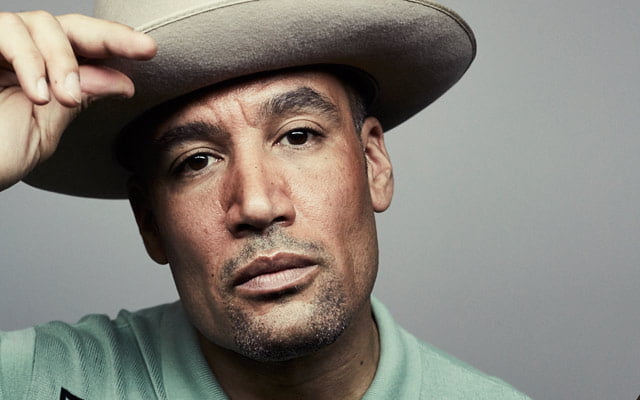
Ben Harper: “I’m not letting go of the fact that this is some soul-based shit!”
The genre-blending, Grammy-winning musician and performer extols the benefits of songwriting, collaborating, skateboarding and channelling the frequencies of the universe
Three-time Grammy Award-winning singer, songwriter and guitarist Ben Harper plays an eclectic mix of folk, blues, hard rock, country, jazz and reggae. Growing up in a musical family, he quickly developed his craft as a singer-songwriter and guitarist, played his first gig at the age of 12 and by his early 20s performed live with iconic bluesman Taj Mahal. In 1992, Ben signed with Virgin Records and released his debut album, Welcome To The Cruel World, the first of 12 studio albums he would make as a solo artist.
But over the next 25 years, Ben Harper would rarely cut a lone figure. With his supporting band, The Innocent Criminals, he released his third album The Will to Live in 1997, and then Burn To Shine two years later. His first studio album of the new millennium was 2003’s Diamonds On The Inside, which showcased two songs recorded with Ladysmith Black Mambazo.
In 2004, he collaborated with The Blind Boys of Alabama on an album of gospel songs, There Will Be a Light, which reached No 1 on Billboard’s gospel chart and took a Grammy for Best Traditional Soul Gospel Album, while the track 11th Commandment won Ben an award in the category of Best Pop Instrumental Performance.
Ben Harper also formed the bands Fistful Of Mercy (with Dhani Harrison and Joseph Arthur) and Relentless7, recording albums and continuing to performing live with each of them. He teamed up with legendary blues harmonica player and guitarist Charlie Musselwhite for the 2013 album Get Up! and collaborated with him again to create 2018’s No Mercy In This Land.
We took this opportunity to catch up with Ben in his studio, Machine Shop, in Santa Monica, and ended up talking about skateboarding, the universe, jamming lyrics, and bumping into Larry David…
You’re well known for playing the lap steel guitar. How did you discover that instrument?
“I grew up in a music store called the Claremont Folk Music Center, and it’s still open to this day. It was a musical and literary epicentre for my region of the world, which was in Southern California. The people who have wandered through those doors: from Sonny Terry and Brownie McGhee, John Fahey, Leonard Cohen and Jackson Browne, just to name a few. That was my childhood and upbringing, so the lap steel guitar just happened to resonate with me the deepest.
“In my early 20s, I was very much focused on all things slide guitar and blues. So I was in my family’s music store and within that environment you start to see people coming in, who were writing their own material. I was knee-deep in the blues at that point and I was very focused on learning and playing blues music – I was going around the world, meeting living blues legends (those that would have me, anyway!) Then I realised that some of these guys wrote their own songs and once I started forming strong musical opinions, I thought, ‘Oh okay, that’s how that works,’ and I just set out to do it.”
Can you remember when you first wrote a song?
“It was on my first record, Welcome To The Cruel World, and it was called Pleasure And Pain. Norma Waterson covered that song, so that does prove that there was a reason why that one resonated differently. She did a brilliant cover of that, by the way, much better that mine!”
“Here’s the interesting part: I’d probably written about 20 songs before what I would consider my first good song, and when I wrote that it felt different. Something opened up, either in me or in the universe, to let that happen. Now, any time anyone talks about the fucking ‘universe’ they sound like a crystal-toting lunatic! I don’t want to sound like that, but let’s just face it: everything in life has a frequency. Every wind that blows and every step you take is a frequency, so we are all living in a world surrounded by frequency-based realities that we cannot see. So who’s to say that there’s not something that has to resonate in the universe in order to resonate through your soul? You can’t prove that it does, but you can’t prove that it doesn’t, therefore I’m not letting go of the fact that this is some soul-based shit!
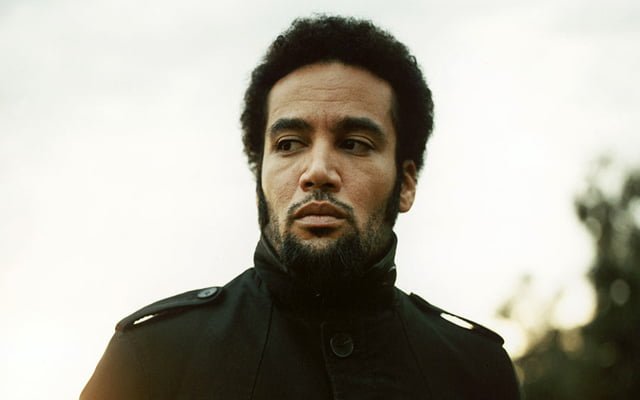
Ben: “I’d rather be a trend, than to fit into one. I’ve never tried to write a song; I’ve always had to write a song.”
Tell us more about writing that debut album.
“The first record was nice because you don’t know what you’re doing, and you’re doing it anyway. There’s a certain purity to that, but there’s also a certain refinement that comes with knowing what you’re doing. When you’re not concerned about a middle eight and you just put one in there because you don’t think about it. Doing something and thinking about doing something are quite different!”
How about your second LP The Will To Live. The guitar sound you produced on that Faded especially was so unusual.
“Yes, that was the heart of my sonic exploration, and lyrical exploration, taking chances. For JP [Jean-Pierre Plunier, the album’s producer] and I, production was a huge part of songwriting. We got turned down by other labels, and one of the reasons was because I refused to let the ballads be produced syrupy – I wanted them to be stripped down.
“Actually, that was a transitional period when I still didn’t know what the fuck I was doing, but I had an idea of where I was going and where I could take it. There was no path for musical eclecticism in that period, so I just felt we were breaking the rules. I had done it so wrong for so long that it was starting to become a style, and it felt great and very liberating. I’ve never looked over my shoulder and taken stock, and I’m still doing it quite wrong! It’s still against the grain.”
Is that a conscious thing?
“No, it’s not. I’ve always been an industry outsider. From time to time, I’ve stolen the keys to the kingdom and got chased straight out again! And there’s no other place I’d rather be. I’d rather be a trend, than to fit into one. I’ve never tried to write a song; I’ve always had to write a song.”
Can you explain that a little bit – is it a cathartic process or simply your ‘work’?
“Trust me, I’ve had to set the pen down out of frustration, but who doesn’t? It’s always been out of necessity and the filter of seeing the world through a song. I know screenwriters and novelists who see the world through a film or a novel. I’ve bumped into Larry David, socially, and he sees the world through absurdity. He takes notes and it ends up being an antic in his programme.
“During The Will To Live period, it was as though the restraints were lifted and, ‘If you’re going to get to a third record as a professional musician, there’s no reason you can’t get to a thirtieth.’ That started to become clear to me.”
Did you enjoy those sessions more?
“Yeah, it was the first time I’d seen any money – I was broke until The Will To Live – and I was about to have my first child. I just was in a place where there was still a naivety but it was a confident naivety. There were fans and people who were going, ‘Go, go, we want more,’ and that was fun. You could fill up a 500-seat room by yourself – I’ve made it!”
And there was confidence in your ability to keep writing?
“The only way I’ve avoided writer’s block for going on 30 years, is to be running from something and not to be worried. Am I running from my childhood or my past, or am I running from not wanting to run out of ideas? Am I running from being who I really am? There’s so much in this life to run from, but at the end of it you’re running towards something. And songwriting was always something I could run towards.
“I was so worried, and everyone says, ‘isolate,’ and I’ve done that and there’s been some interesting stuff that has come out of absolute isolation. I’ve tried it all, but The Will To Live was lived as well as written, and explored by way of biography, autobiography, and novel.”
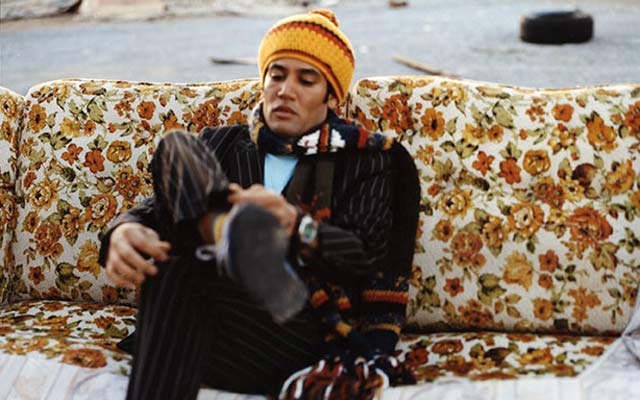
Ben Harper: “Musically I’ve collaborated with various bands, but most people just aren’t bringing lyrics to the table”
Which tracks are you most proud of on that album?
“Songs that stand out on that record are I Shall Not Walk Alone, Roses From My Friends and Jah Work. Those jump out right away.”
Lyrically as well as melodically?
“Both. The combination and collaboration that goes on between melody and lyrics. For that reason, those do jump out at me.”
Did you get The Innocent Criminals involved in the songwriting process, or was it a case of playing them the songs and them running with it?
“Y’know, an ex-drummer from the band [Dean Butterworth] co-wrote a song with me that I’m quite excited about and proud of, that I hear a lot about, called She’s Only Happy In The Sun. For the most part, with The Innocent Criminals in the early stages, songwriting wasn’t their thing – they weren’t looking to do it. So I had to prod it out of them. Dean was the first Innocent Criminal that actually brought me a song that was quite well formed. There were some holes that he allowed me to fill in, but that was probably one of my earliest collaborations. I was always telling them, ‘Bring me songs. I don’t want you to think that I’m being precious about the process.’”
Were you writing music with anyone else at that stage?
“No, I was isolated, solo, just me.”
You’ve frequently collaborated in recording and performance over the years, but do you prefer to write alone?
“As a lyricist, I’ve very rarely have collaborated – I can count the times on one hand. It’s not even for the lack of being open to it, because musically I’ve collaborated with various bands, but most people just aren’t bringing lyrics to the table.”
Well, you can’t really ‘jam’ lyrics.
“[Laughs] Exactly right! The only time I have jammed lyrics is with my other band Fistful Of Mercy, with Joseph Arthur and Dhani Harrison. It was really fun, to just have giant white cardboard paper tacked all over the walls, giant markers, and to just go.”
How did that come about?
“I knew Joseph and Dhani very well and, separately, had been talking about making music with them. Then finally a light went off and we said, ‘Let’s all get in a room,’ and we came out a week later. The jamming with lyrics was borne out of our intensity and lunacy.”
We were lucky enough to interview Dhani Harrison last year and we talked about the band. Are you planning to do more together?
“I’m going to go out on a limb and say yes.”
I suppose the three of you are pretty busy with other projects.
“Absolutely. I’ve never called Dhani when he’s not in the middle of three things that are very important, creatively, to him, and managing his dad’s world. I don’t know how he does it.”
You’ve been pretty busy yourself over the years. Is it 15 albums you’ve released now?
“I have lost count! It depends if you include live albums and Fistful Of Mercy, y’know.”
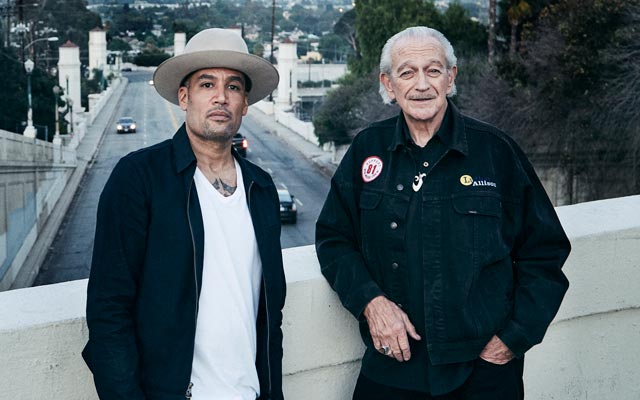
Ben and Charlie Musselwhite: “Knowing it’s Charlie … I’ve got to aim high! So I bring my ‘A’ game”
Let’s talk about the new album with Charlie Musselwhite. How did you start working with him?
“Working with Charlie came out of a lifetime of appreciation, up until the point that I met him through John Lee Hooker. John was helping a small club to pay its bills, so he was doing some free shows and Charlie was sitting in with him. John Lee had heard my music and invited me to be the opening act, which was hugely exciting, as you can imagine. So I met Charlie in ’93 and we stayed in touch after those shows, for years. Then in 1997, John Lee invited Charlie and I into the studio to play with him on what would be his last studio record. And John Lee mentioned that our sound leant itself to one another and we should do more stuff as a duo. That always stuck with Charlie and I, then 15 years later we got into the studio – we’d talked about it for that long.”
Why did it take you so long?
“Timing, and also I had to live my way into being worthy of sitting at the table with Charlie. It took me 15 years to set aside the blues to be ready.”
How did you write together?
“Here’s the thing: I bring the songs forward and I usually pick 10 out of 20, so that was the case. Knowing it’s Charlie Musselwhite, who’s played with Howling Wolf, Muddy Waters, Little Walter and all the greats, I’ve got to aim high! So I bring my ‘A’ game and 10 hit the mark, and we leaned into them. I’m of the age now where I feel comfortable bringing people into the fold. I mean, as much as I bring the songs, I’m giving people songwriting credit for their instruments and what they’re playing, and bringing the song to life. Even though you could bring it to life in a hundred different ways, out of reverie for the players I’ve got to cut them in. I say, ‘Hey man, the drummer made the drum part, here’s your cut.’”
You say you brought your ‘A’ game for Charlie, because you have a lot of respect for him, but were you trying to craft the songs in a different way?
“With Charlie at the centre of the circle, it gives me something to aim for. So it’s not as though I changed, but on this particular record I was merciless on myself. Not that I’ve ever had a throwaway line, but I trimmed the fat off this record like you wouldn’t believe!”
If you could form a duo with anyone else, who would be top of the wish list?
“Tom Waits. Just playing Closing Time the other night, my wife and I, and our mouths were agape at how beautiful it is. Ah, come on!”
What do you do to relax when you’re not making music?
“Skateboard. I skate. I jump down things, over things, flip tricks and stuff like that. I’ve been non-stop for the last six or seven years. If your mind is not clear while you’re skating, you’re in trouble!”
Interview: Aaron Slater

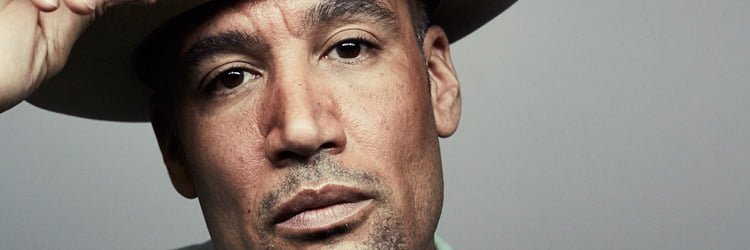


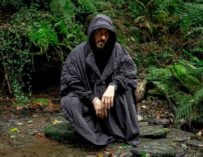
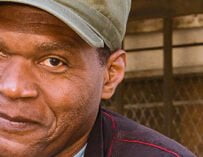


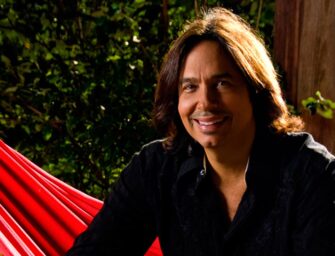
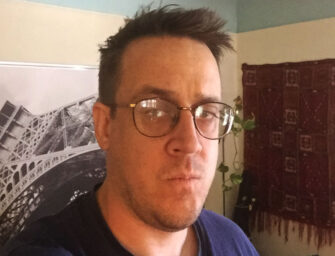

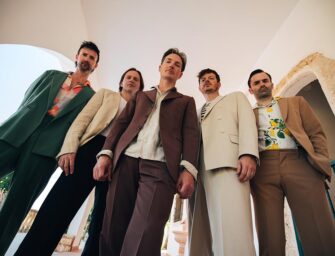























Related Articles